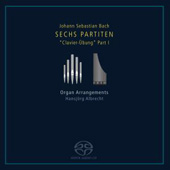
ESSENTIAL RECORDINGS

To describe the Six Partitas by Johann Sebastian Bach you have to get a mind set that references the time and the dominant cultural influences of the era.
The French had great influence in Europe at this time. Of the many bodies of rulers in Germany there were competitions to keep up with the latest and greatest.
French dance masters were available to train the required steps and stances. French dance trained both posture and step, it trained nobility in the physical
form. Bach as a young violinist played in court at times where French dance was performed, and through the very least a keen observance of the rhythms and cadence of the dances he gained an intimate understanding of the forms. It is also possible that Bach was trained to a degree in some of the dances, it was after all a dance form that was popular even among the middle classes of Germany at the time.
The influence of French dance lives down to this day in the form of Ballet. A long lasting legacy to be sure.
So were the partitas music to dance by?
The first page of the 1726 printing reads as follows:
Keyboard Practice, consisting of preludes, allemandes, courantes, sarabandes, gigues, minuets, and other galanteries, composed for music lovers, to refresh their spirits, by Johann Sebastian Bach, Actual Capellmeister to His Highness the Prince of Anhalt-Cöthen and Directore Chori Musici Lipsiensis. Partita I. Published by the Author. 1726.
They were compositional tours de force. A throwing down of the gauntlet so to speak. A musical statement of this is what I can do. They were published singly from 1726 until 1731 when they were gathered together as a set and published as Sebastian Bach's self described Opus 1. These were not pieces that were easily performed by the masses, they were admired by the people who knew and understood music at the time of Bach, even though they were criticized for being difficult to play. That is indeed true, but the music wrought from these dances is inspiring to say the very least.
In this recording we have the organist Hansjörg Albrecht doing what he does best. He has the ability to take a score and bring it alive in manners that few other musicians possess.
Our recording is done on the Metzler Organ of St. Cyriakus, Krefeld-Hüls. It is a moderately sized organ well situated in the building to speak with great openess and clarity. We get all the usual stops and some rather interesting surprises. Principals from 32 foot up to 8 foot provide a solid foundation which we come to expect from the Metzler organs, a great variety of reeds allow this choice of instrument to be played in a manner most interesting for the listener. We get to here wonderful clear and sweet flutes, sparkling mixtures, and deep sonorities. Comfort food for the ears. But wait, there is also spices, wonderful bold trumpets en chamade, and blazing french baroque stops that spit fire and sulphur.
So we get to hear the Partitas in a way that the harpsichord version only suggests, gives us little peaks into the real soundscape that could exist if there were the tonal resources available. It is enlightening to hear the various lines of music in greater clarity. You are enabled, given a clearer view of what could be done, what may have been meant. It is a very engaging way to listen to the partitas. To be sure there is a great difference in listening to them on the piano or the harpsichord. Unfortuately there are many versions out there that do not do them justice. What Hansjörg has done is anything but stuffy. And it has been enjoyable for me to listen to the smaller versions for many years. But this new recording is like jumping from a nice sedan to a spiffy little sports car. It's just plain old fun! I invite you to listen and compare your favorite version with this one. It has a permanent place in my collection. My two thumbs up whole heartedly.
Mark Kravchenko - February 2013